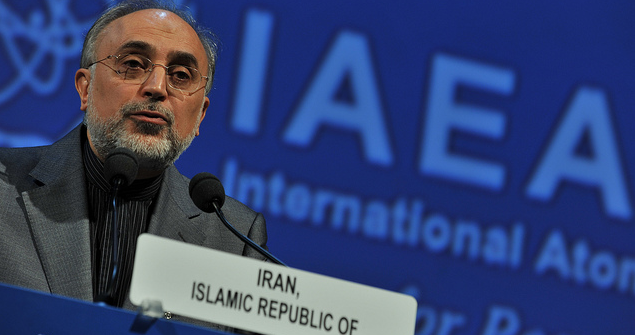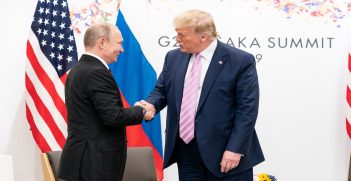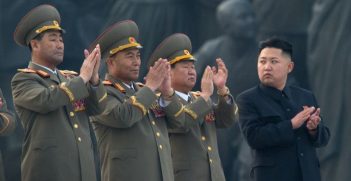Australia Reviews its Policy on the Iran Nuclear Deal

Australia’s national interests dictate that it should continue to support the nuclear deal with Iran. However, the government’s review is an opportunity to canvass complementary measures to address security and human rights in the Middle East.
On 24 October, Prime Minister Scott Morrison and Minister for Foreign Affairs Marise Payne announced a “without prejudice” review of Australia’s approach to the 2015 Joint Comprehensive Plan of Action (JCPOA) in which Iran agreed to significant constraints on its nuclear program in return for the lifting of international sanctions. Iran’s partners in the JCPOA negotiations were the UN Security Council Permanent-5, together with Germany and the EU.
What’s in the deal?
Under the deal, Iran reaffirmed that “under no circumstances” would it ever seek nuclear weapons and provided for stringent inspection by the International Atomic Energy Agency (IAEA).
When the IAEA deemed Iran compliant, Australia, among others, eased its sanctions to not only demonstrate the benefits of compliance, but also to ensure that Australian businesses were not disadvantaged. Australia’s trade promotion office in Tehran, which closed in 2010, was reopened in 2016.
However, new President Trump dubbed the JCPOA the “worst deal ever made”. The US formally withdrew from the arrangement in May and reapplied sanctions this month, providing relief for key stakeholders including India, China, Japan, South Korea and Taiwan.
Despite US withdrawal, other parties reconfirmed their commitment. Iran recorded in the JCPOA that it would treat the re-introduction of nuclear-related sanctions “as grounds to cease performing its commitments under this JCPOA”. To date, it has not ceased upholding its commitments.
Australia’s then Prime Minister, Malcolm Turnbull, regretted the US withdrawal and urged all parties to continue compliance.
Australia’s review
However, in mid-October, during campaigning for a sensitive by-election, which threatened the government’s slender lower-house majority, new Prime Minister Scott Morrison announced four measures related to Australia’s relations in the Middle East, presumably designed to appeal to the electorate’s sizeable Jewish vote. One of those four measures was the commitment to review Australia’s approach to the JCPOA, to be completed by December.
The review is to address two related questions:
- Whether Australia’s current policy settings in relation to the JCPOA remain fit for purpose;
- Whether the JCPOA remains the best vehicle to address the international community’s concerns about Iran’s nuclear ambitions.
The arguments in favour of continued support for the JCPOA include:
- There is no other “vehicle” in prospect: the JCPOA was the result of a difficult and long negotiation.
- Being endorsed by the UN Security Council, it is a part of the rules-based international order that Australia should uphold.
- The IAEA has determined that Iran is complying with the JCPOA and that it has therefore reduced Iran’s “nuclear activities of concern”.
- The JCPOA reinforces global non-proliferation norms based on the Nuclear Non-Proliferation Treaty.
- It continues to command the support of all other parties to the deal and Australia’s Indo-Pacific partners.
- By undermining trust in agreements, disrespecting this arrangement could undermine efforts to contain other proliferation challenges, specifically North Korea.
- The US clearly wants the JCPOA constraints on Iran’s nuclear program maintained.
Whether the JCPOA remains “fit for purpose” depends on the government’s aims. President Trump correctly argues that the JCPOA does not address all of Iran’s egregious behaviours: it dealt only with the immediate threat of Iran’s rapidly expanding nuclear capabilities and was intended to buy time so that broader regional security issues could be addressed. The list of US concerns, many of which are shared by Australia, includes chemical and biological weapons, missile development, support for terrorists, promotion of regional militias and human rights issues.
What recommendations might the review contain? Australia is not a party to the JCPOA so withdrawal is not an option. Consistent with its non-proliferation policies, and its support for a rules-based international order, the review could include:
- Advocacy of the continued application of the most stringent verification to ensure Iran’s continued compliance.
- Coordination with others in ensuring the highest standards of nuclear export controls, with particular attention to the Middle East.
- Support for mechanisms to address nuclear concerns beyond the limited timeframes addressed by the JCPOA.
- Working with like-minded countries and the IAEA to ensure that all elements of Iran’s nuclear programs are fully understood and contained.
- Working with the US and others to ensure the IAEA has the resources to meet the growing demands for its services.
- Strengthening Australia’s own commitment to nuclear non-proliferation and security by the appointment of a dedicated Ambassador to the IAEA, as has already been done by some nations including the US.
More broadly the Australian Government will have ongoing interest in all the issues that the Trump Administration has raised about Iranian behaviour. However, having wound back its commitments in Iraq and elsewhere in the Middle East, the Morrison Government is unlikely to seek a leading role. The review could address Australia’s position on several issues:
- Support for enhanced measures to contain chemical and biological threats in the Middle East through the Australia Group.
- Giving continued high priority to counter-terrorism efforts including engagement with Iran and others in the Middle East.
- Committing to ongoing collaboration leveraging Australia’s contributions to stemming violent Islam and stabilising Middle East regional security.
The review will need to consider the impact of any lessening of international support for the JCPOA on Iran’s domestic political situation, specifically the encouragement that it might give to hard-line domestic opponents to any constraints on Iran’s nuclear ambitions.
The bilateral relationship between Australia and Iran could be considered by the review. In the absence of a US Embassy in Iran, the continuous Australian presence has proved of special value, which could be strengthened as a diplomatic channel to raise important issues such as human rights.
Despite the reopening of a trade promotion office, Australia’s bilateral trade with Iran is marginal. In light of tightened US sanctions, Australian firms will face greater difficulties. The review could conclude that a trade facilitation office in Tehran is not warranted in current circumstances.
Finally, the review is likely to canvass Australia’s options regarding sanctions. To date, US withdrawal from the JPCOA and reapplication of sanctions has had no impact on the sanctions relief accorded by Australia in 2016. To avoid undermining the JCPOA, Australia should not consider reinstating those sanctions in the absence of an adverse finding by the IAEA. The review could, however, canvas responses to any reneging by Iran on nuclear issues. It could also consider sanctions as a tool for messaging on other behaviours threatening regional security and the welfare of the Iranian people. The prospect of such changes would inevitably add to the risks of Australian business activity in Iran.
John Tilemann is the director of research for the Asia-Pacific Leadership Network on Nuclear Non-Proliferation and Disarmament. He is a former career diplomat and was chief of staff to IAEA directors-general Hans Blix and Mohamed ElBaradei.
This article is published under a Creative Commons Licence and may be republished with attribution.





